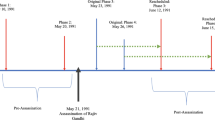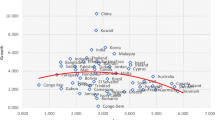Abstract
This article uses statistical methods to examine the relationship between two key macroeconomic indicators—inflation and economic growth—and four measures of political instability—peaceful unrest, violent unrest, coups d’etat, and changes of government. Using a panel research design and fixed effects regression analysis, I examine first whether contemporaneous relationships exist between these two groups of variables and then the direction of causality between them. Peaceful unrest clearly produces higher inflation and slower growth. Oddly, coups d’etat seem to producelower inflation, and there is some evidence that reverse causation may operate here as well—that high inflation mayreduce the likelihood of coups. Slow economic growth is associated with higher levels of violent unrest and a higher likelihood of coups and changes of government, but the direction of causality in these relationships is not clear. These findings, taken together, suggest that the relationship between macroeconomic conditions and political instability runs primarily from the latter to the former, raising doubts about the widely held view that poor economic conditions generally produce unrest and instability.
Similar content being viewed by others
References
ALESINA, ALBERTO, SULE OZLER, NOURIEL ROUBINI, and PHILLIP SWAGEL 1996 Political Instability and Economic Growth.Journal of Economic Growth 1: 189–211.
ALESINA, ALBERTO, and HOWARD ROSENTHAL 1995Partisan Politics, Divided Government, and the Economy. Cambridge: Cambridge University Press.
BANKS, ARTHUR S. 1979Cross-National Time-Series Data Archive, User’s Manual, Revised Edition, Binghampton, NY: Center for Social Analysis, State University of New York at Binghampton (tape version).
BARRO, ROBERT J. 1991 Economic Growth in a Cross Section of Countries.Quarterly Journal of Economics 106: 407–444.
BROCKETT, CHARLES D. 1992 Measuring Political Violence and Land Inequality in Central America.American Political Science Review 86: 169–176.
CUKIERMAN, ALEX, SEBASTIAN EDWARDS, and GUIDO TABELLINI 1992 Seigniorage and Political Instability.American Economic Review 82: 537–555.
DAVIES, JAMES C. 1962 Toward a Theory of Revolution.American Sociological Review 27: 5–19.
DEUTSCH, KARL W. 1961 Social Mobilization and Political Development.American Political Science Review 60: 493–514.
EDWARDS, SEBASTIAN 1994 The Political Economy of Inflation and Stabilization in Developing Countries.Economic Development and Cultural Change 42: 235–266.
ELLINA, M., and W. H. MOORE 1990 Discrimination and Political Violence: A Cross-National Study With Two Time Periods.Western Political Quarterly 43: 267–278.
GASIOROWSKI, MARK J. 1995 Economic Crisis and Political Regime Change: An Event History Analysis.American Political Science Review 89: 882–897.
GRANGER, C. W. J., and PAUL NEWBOLD 1986Forecasting Econometric Time Series, Second Edition. Orlando: Academic Press.
GREENE, WILLIAM H. 1991LIMDEP Version 6.0, User’s Manual and Reference Guide, Bellport, NY: Econometric Software, Inc.
GREENE, WILLIAM H. 1993Econometric Analysis, Second Edition, Englewood Cliffs, NJ: Prentice Hall.
GUPTA, DIPAK K. 1991The Economics of Political Violence. New York: Praeger.
GURR, TED R. 1970Why Men Rebel, Princeton: Princeton University Press.
GURR, TED R. 1993 Why Minorities Rebel: A Global Analysis of Communal Mobilization and Conflict Since 1945.International Political Science Review 14: 161–201.
HIBBS, DOUGLAS A. 1973Mass Political Violence: A Cross-National Causal Analysis, New York: John Wiley & Sons.
HSIAO, CHENG 1986Analysis of Panel Data. Cambridge: Cambridge University Press.
HUNTINGTON, SAMUEL P. 1968Political Order in Changing Societies. New Haven: Yale University Press.
JENKINS, J. CRAIG 1983 Resource Mobilization Theory and the Study of Social Movements.Annual Review of Sociology 9: 527–553.
LENIN, V. I. 1975 [1917] Imperialism, the Highest Stage of Capitalism. InThe Lenin Anthology, ed. Robert C. Tucker, New York: W. W. Norton.
LEWIS-BECK, MICHAEL 1988Economics and Elections. Ann Arbor: University of Michigan Press.
LICHBACH, MARK I. 1989 An Evaluation of ‘Does Economic Inequality Breed Political Conflict?’ Studies.World Politics 41: 431–470.
LONDREGAN, JOHN B., and KEITH T. POOLE 1990 Poverty, the Coup Trap, and the Seizure of Executive Power.World Politics 42: 151–183.
MARX, KARL 1967 [1887]Capital: A Critique of Political Economy. New York: International Publishers.
MOADDEL, MANSUR 1994 Political Conflict in the World Economy: A Cross National Analysis of Modernization and World-System Theories.American Sociological Review 59: 276–303.
MULLER, EDWARD N., and ERICH WEEDE 1990 Cross-National Variation in Political Violence: A Rational Actor Approach.Journal of Conflict Resolution 34: 624–651.
O’DONNELL, GUILLERMO A. 1973Modernization and Bureaucratic Authoritarianism: Studies in South American Politics. Berkeley: Institute for International Studies.
OLSON, MANCUR 1963 Rapid Growth as a Destabilizing Force.Journal of Economic History 23: 529–552.
PEARSON, FREDRIC S. 1974 Foreign Military Intervention and Domestic Disputes.International Studies Quarterly 18: 259–290.
PERSSON, THORSTEN, and GUIDO TABELLINI 1994Monetary and Fiscal Policy, Volume 2: Politics. Cambridge: MIT Press.
ROBERTSON, JOHN D. 1983 Inflation, Unemployment, and Government Collapse.Comparative Political Studies 15: 425–444.
ROUBINI, NOURIEL 1991 Economic and Political Determinants of Budget Deficits in Developing Countries.Journal of International Money and Finance 10: 549–572.
SANDERS, DAVID 1981Patterns of Political Instability. New York: St. Martin’s Press.
SCHOCK, KURT 1996 A Conjunctural Model of Political Conflict.Journal of Conflict Resolution 40: 98–133.
SKIDMORE, THOMAS E. 1977 The Politics of Economic Stabilization in Postwar Latin America. InAuthoritarianism and Corporation in Latin America, ed. James M. Malloy. Pittsburgh: University of Pittsburgh Press.
SKOCPOL, THEDA 1979States and Social Revolutions, New York: Cambridge University Press.
STIMSON, JAMES A. 1985 Regression in Space and Time: A Statistical Essay.American Journal of Political Science 29 (4): 915–947.
STOHL, MICHAEL The Nexus of Civil and International Conflict. InHandbook of Political Conflict: Theory and research, ed. Ted Robert Gurr, New York: The Free Press.
TILLY, CHARLES 1978From Modernization to Revolution, Reading. MA: Addison-Wesley.
WANG, T. Y. 1993 Inequality and Political Violence Revisited: Comment on Muller and Seligson (1987).American Political Science Review 87: 979–983.
WORLD BANK 1994World Bank 1994 Indicators on CD-ROM. Washington: International Bank for Reconstruction and Development.
Additional information
Mark J. Gasiorowski is an Associate Professor in the Department of Political Science at Louisiana State University. He is currently working on a project focusing on the relationship between democracy and macroeconomic conditions.
Rights and permissions
About this article
Cite this article
Gasiorowski, M.J. Macroeconomic conditions and political instability: An empirical analysis. St Comp Int Dev 33, 3–17 (1998). https://doi.org/10.1007/BF02687489
Issue Date:
DOI: https://doi.org/10.1007/BF02687489




